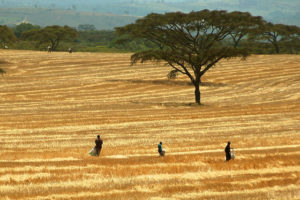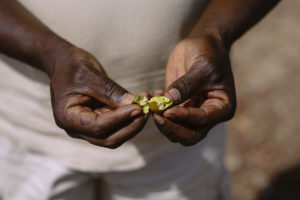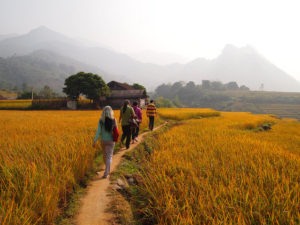
CGIAR has officially launched its new research portfolio, comprising 11 research programs and three platforms, representing the second generation of its multidimensional work streams. The CGIAR Research Program on Forests, Trees and Agroforestry (FTA) is key among these programs.
FTA is a worldwide research for development partnership, led by the Center for International Forestry Research (CIFOR) in partnership with two other CGIAR centers, namely the World Agroforestry Centre (ICRAF) and Bioversity International, as well as four international research institutions: CATIE, CIRAD, the International Bamboo and Rattan Organisation (INBAR) and Tropenbos International.
The CGIAR Portfolio 2017-2022 aims to reduce rural poverty, advance food and nutrition security and improve natural resources and ecosystem services. It maintains momentum in selected areas while placing renewed emphasis on key issues.
FTA plays a specific role in the overall CGIAR portfolio as the only program working on all aspects of the value and benefits of trees and forests for agriculture, landscapes and livelihoods, to contribute to sustainable development, improve food security and nutrition, and address climate change.
FTA links with six other agri-food systems programs by providing tree-based and landscape-level solutions to ecological intensification of crop-based production systems. It contributes to CGIAR’s integrative programs for policies, institutions and markets, and more.
Its research explores the central role that forest, tree and agroforestry resources play in improving production systems, in securing people’s livelihoods and in promoting the equitable distribution of benefits. At the same time, forest, tree and agroforestry systems protect and enhance the resource base by clarifying the interactions between productivity and ecosystem services in tree-based systems, as outlined in a new FTA leaflet.

“FTA systems, as we call them, are crucial for the planet, critical for many countries – for economic, social, environmental reasons – and essential for the many households that depend on them for their livelihoods and food security,” FTA Director Vincent Gitz wrote in a blog titled Forests, trees and agroforestry research to advance sustainable development on his vision for Phase II of the program. “FTA at the beginning of Phase II is well equipped for joined-up work across scales, toward effective implementation and impact,” he added.
The overall strategic direction for the CGIAR portfolio (including FTA) is based on the CGIAR Strategy and Results Framework and the UN’s Sustainable Development Goals (SDGs), and has been developed and informed by the former Fund Council, CGIAR System Council, Science Council, Research Centers and other stakeholders.
CGIAR and FTA’s research will provide scientific leadership, and focus on key partnerships for achieving development impact at scale.
Focused on selected development challenges, the CGIAR portfolio is designed to contribute significantly to the achievement of key SDGs and of CGIAR’s overall goals, of 150 million fewer hungry people, 100 million fewer poor people – at least 50% of whom are women – and 190 million fewer hectares of degraded land by 2030.
This new phase of research builds on CGIAR’s long track record of impact. Across Africa, Asia and Latin America, CGIAR and its partners have improved food security, improved nutrition and increased community resilience to a changing environment in numerous ways.
The new phase of CGIAR research will draw on the expertise of CGIAR’s global network and a multitude of world class partners. The portfolio structure enables researchers to align research priorities and approaches into efficient, coherent, multidisciplinary programs allowing for collaborative research to tackle complex development issues.

The new portfolio is structured around three clusters. The first cluster gathers seven programs around Agri-Food Systems: Fish; Forests, Trees and Agroforestry; Livestock; Maize; Rice; Roots, Tubers and Bananas; and Wheat. The second cluster consists of four cross-cutting programs: Agriculture for Nutrition and Health, Climate Change, Agriculture and Food Security; Policies, Institutions and Markets; and Water, Land and Ecosystems. The final cluster includes three research support platforms that underpin the entire research system, focused on Big Data in Agriculture; Excellence in Breeding and Genebank.
FTA has a special position within the portfolio because of its very integrated nature and because it works across the landscapes continuum, from natural forests to planted forests, tree-based systems, agro-ecological infrastructures, trees in crops systems, agroforestry and farming. In 2017, FTA’s work includes 118 projects in 41 countries in 2017.
Thanks to its funders, CGIAR research has and will continue to transform the lives of hundreds of millions of people through tangible research outcomes. CGIAR is committed to helping the world radically transform its collective approaches and strengthen operations to deliver on-the-ground solutions to the planet’s most vulnerable.
“In Phase II, FTA is ready to provide integrated approaches and solutions. I would call it a multiple integration,” said Gitz. FTA takes on an integrated approach to the various roles of forests and trees within ecosystems, including agroecosystems, at different scales and applied to different contexts, to deliver on solutions to enhance these roles, integrating technical level and practices, management, policies and governance.
Adapted from material originally published at CGIAR.org. Edited by Hannah Maddison-Harris, FTA Communications and Editorial Coordinator.











